Читать книгу The Philosopher's Toolkit - Julian Baggini, Julian Baggini - Страница 28
The problem of induction
ОглавлениеAlthough there are lots of kinds of induction besides inductive generalisations, that species of induction is, when it comes to actual practices of reasoning, often where the action is. Reasoning in experimental science, for example, commonly depends on inductive generalisations in so far as scientists formulate and confirm universal natural laws (e.g. Boyle’s ideal gas law) only with a degree of probability based upon a relatively small number of observations. Francis Bacon (1561–1626) argued persuasively for just this conception of induction.
The tricky thing to keep in mind about inductive generalisations, however, is that they involve reasoning from a ‘some’ in a way that in deduction would require an ‘all’ (where ‘some’ means at least one but perhaps not all of some set of relevant individuals). Using a ‘some’ in this way makes inductive generalisation fundamentally different from deductive argument (for which such a move would be illegitimate). It also opens up a rather enormous can of conceptual worms. Philosophers know this conundrum as the problem of induction. Here’s what we mean. Take the following example:
1 Almost all elephants like chocolate.
2 This is an elephant.
3 Therefore, this elephant likes chocolate.
This is not a well‐formed deductive argument, since the premises could possibly be true and the conclusion still be false. Properly understood, however, it may be a strong inductive argument – if the conclusion is taken to be probable, rather than certain.
On the other hand, consider this rather similar argument:
1 All elephants like chocolate.
2 This is an elephant.
3 Therefore, this elephant likes chocolate.
Though similar in certain ways, this one is, in fact, a well‐formed deductive argument, not an inductive argument at all. One way to think of the problem of induction, therefore, is as the problem of how an argument can be good reasoning as induction but be poor reasoning as a deduction. Before addressing this problem directly, we must take care not to be misled by the similarities between the two forms.
